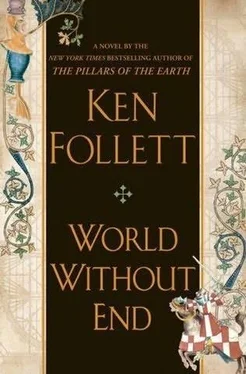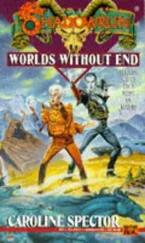When Ralph came to Wigleigh he went around the back of the manor house and looked into the big timber barn, which at this time of year should have been filling with grain ready for milling – but it was empty, and a cat had given birth to a litter of kittens in the hay loft.
“What will we do for bread?” he roared at Nathan Reeve. “With no barley to make ale, what will we drink? You’d better have a plan, by God.”
Nate looked churlish. “All we can do is reallocate the strips,” he said.
Ralph was surprised by his surliness. Nate was usually sycophantic. Then Nate glared at young Sam, and Ralph realized why the worm had turned. Nate hated Sam for killing Jonno, his son. Instead of punishing Sam, Ralph had first pardoned him, then made him a squire. No wonder Nate looked resentful.
Ralph said: “There must be one or two young men in the village who could farm some extra acres.”
“Ah, yes, but they aren’t willing to pay an entry fee,” Nate said.
“They want land for nothing?”
“Yes. They can see that you have too much land and not enough labour, and they know when they’re in a strong bargaining position.” In the past Nate had been quick to abuse uppity peasants, but now he seemed to be enjoying Ralph’s dilemma.
“They act as if England belongs to them, not to the nobility,” Ralph said angrily.
“It is disgraceful, lord,” said Nate more politely, and a sly look came over his face. “For example, Wulfric’s son Davey wants to marry Amabel and take over her mother’s land. It would make sense: Annet has never been able to manage her holding.”
Sam spoke up. “My parents won’t pay the entry fee – they’re against the marriage.”
Nate said: “Davey could pay it himself, though.”
Ralph was surprised. “How?”
“He sold that new crop he grew in the forest.”
“Madder. Obviously we didn’t do a sufficiently thorough job of trampling it. How much did he get?”
“No one knows. But Gwenda has bought a young milking cow, and Wulfric has a new knife… and Amabel wore a yellow scarf to church on Sunday.”
And Nate had been offered a fat bribe, Ralph guessed. “I hate to reward Davey’s disobedience,” he said. “But I’m desperate. Let him have the land.”
“You would have to give him special permission to marry against his parents’ will.”
Davey had asked Ralph for this, and Ralph had turned him down, but that was before the plague decimated the peasantry. He did not like to revisit such decisions. However, it was a small price to pay. “I shall give him permission,” he said.
“Very well.”
“But let’s go and see him. I’d like to make the offer in person.”
Nate was startled, but of course made no objection.
The truth was that Ralph wanted to see Gwenda again. There was something about her that made his throat go dry. His last encounter with her, in the little hunting lodge, had not satisfied him for long. He had thought about her often in the weeks since then. He got little satisfaction nowadays from the kind of women he normally lay with: young prostitutes, tavern wenches and maidservants. They all pretended to be delighted by his advances, though he knew they just wanted the present of money that came afterwards. Gwenda, by contrast, made no secret of the fact that she loathed him and shuddered at his touch; and that pleased him, paradoxically, because it was honest and therefore real. After their meeting in the hunting lodge he had given her a purse of silver pennies, and she had thrown it back at him so hard that it had bruised his chest.
“They’re in Brookfield today, turning their reaped barley,” Nate said. “I’ll take you there.”
Ralph and his men followed Nate out of the village and along the bank of the stream at the edge of the great field. Wigleigh was always windy, but today the summer breeze was soft and warm, like Gwenda’s breasts.
Some of the strips of land here had been reaped, but in others Ralph despaired to see overripe oats, barley rank with weeds, and one patch of rye that had been reaped but not bundled, so that the crop lay scattered on the ground.
A year ago he had thought that all his financial troubles were over. He had come home from the most recent French war with a captive, the Marquis de Neuchatel, and had negotiated a ransom of fifty thousand pounds. But the marquis’s family had not been able to raise the money. Something similar had happened to the French king, Jean II, captured by the prince of Wales at the battle of Poitiers. King Jean had stayed in London for four years, technically a prisoner, though living in comfort at the Savoy, the new palace built by the Duke of Lancaster. The king’s ransom had been reduced, but still it had not been paid in full. Ralph had sent Alan Fernhill to Neuchatel to renegotiate his prisoner’s ransom, and Alan had reduced the price to twenty thousand, but again the family had failed to pay it. Then the marquis had died of the plague, so Ralph was insolvent again, and had to worry about the harvest.
It was midday. The peasants were having their dinner at the side of the field. Gwenda, Wulfric and Davey were sitting on the ground under a tree eating cold pork with raw onions. They all jumped to their feet when the horses came near. Ralph went over to Gwenda’s family and waved the rest away.
Gwenda wore a loose green dress that hid her shape. Her hair was tied back, making her face more rat-like. Her hands were dirty, with earth under the nails. But, when Ralph looked at her, in his imagination he saw her naked, ready, waiting for him with an expression of resigned disgust at what he was about to do; and he felt aroused.
He looked away from her to her husband. Wulfric stared back at him with a level gaze, neither defiant nor cowed. There was a little grey now in his tawny beard, but still it would not grow over the scar of the sword cut Ralph had given him. “Wulfric, your son wants to marry Amabel and take over Annet’s land.”
Gwenda responded. She had never learned to speak only when spoken to. “You’ve stolen one son from me – will you take the other now?” she said bitterly.
Ralph ignored her. “Who will pay the heriot?”
Nate put in: “It’s thirty shillings.”
Wulfric said: “I haven’t got thirty shillings.”
Davey said calmly: “I can pay it.”
He must have done very well out of his madder crop, Ralph thought, to be so cool about such a large sum of money. “Good,” he said. “In that case-”
Davey interrupted him. “But on what terms are you offering it?”
Ralph felt his face redden. “What do you mean?”
Nate intervened again. “The same terms as those upon which Annet holds the land, of course.”
Davey said: “Then I thank the earl, but I will not accept his gracious offer.”
Ralph said: “What the devil are you talking about?”
“I would like to take over the land, my lord, but only as a free tenant, paying cash rent, without customary dues.”
Sir Alan said threateningly: “Do you dare to haggle with the earl of Shiring, you insolent young dog?”
Davey was scared but defiant. “I’ve no wish to offend, lord. But I want to be free to grow whatever crop I can sell. I don’t want to cultivate what Nate Reeve chooses regardless of market prices.”
Davey had inherited that streak of stubborn determination from Gwenda, Ralph thought. He said angrily: “Nate expresses my wishes! Do you think you know better than your earl?”
“Forgive me, lord, but you neither till the soil nor go to market.”
Alan’s hand went to the hilt of his sword. Ralph saw Wulfric glance at his scythe, lying on the ground, its sharp blade gleaming in the sunlight. On Ralph’s other side, young Sam’s horse skittered nervously, picking up its rider’s tension. If it came to a fight, Ralph thought, would Sam fight for his lord, or for his family?
Читать дальше












